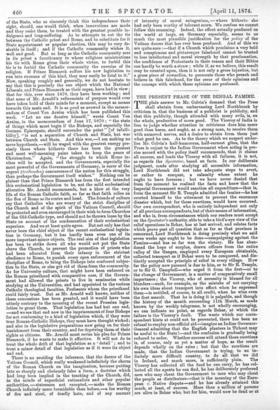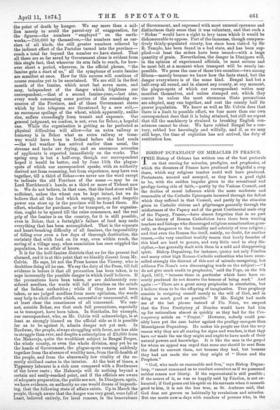THEPRESENT PHASE OF THE BENGAL FAMINE.
THE plain answer to Mr. Colvin's demand that the Press shall abstain from embarrassing Lord Northbrook by criticism is, that the business of a publicist is publicity, and that this publicity, though attended with many evils, is, on the whole, productive of more good. The Viceroy of India is free to judge whether attention to criticisms does him more good than harm, and ought, as a strong man, to receive them with unmoved nerves, and a desire to obtain from. them just what good he can. As to the theory which we suspect under- lies Mr. Colvin's half-humorous, half-earnest gibes, that the Press is unjust to the Indian Government when acting in pre- cise accord with the policy itself recommends, that it claims all success, and loads the Viceroy with all failures, it is not, as regards the Spectator, based on facts. In our deliberate judgment, made after studying all accessible information, Lord Northbrook did not take adequate steps to avert, or rather to conquer, a calamity whose extent he ought to have foreseen ; but we have never denied that from the moment he realised the facts and knew that the Imperial Government would sanction all expenditure—that is, from the moment Sir R. Temple admitted the famine—he has exerted himself to the uttermost to prevent the enormous disaster which, but for those exertions, would have occurred. Our own correspondent, who is entirely independent not only of all previous correspondents, but of their means of information, and who is, from circumstances which our readers must accept on the Spectator's authority, able to take a bird's-eye view of the relief operations in Behar, has at last arrived, and relates facts which prove past all question that as far as that province is concerned, Lord Northbrook is doing precisely what we said seven weeks ago ought to be done—campaigning against the Famine—and has so far won the victory. He has aban- doned the hope of surplus, drawn officers from the entire valley of the Ganges, employed every European obtainable, collected transport as if Behar were to be conquered, and dis- tinctly accepted the principle of relief in every village. Haw far the policy now pursued is due to him, or to Sir R. Temple, or to Sir G. Campbell—who urged it from the first—or to the change of Government, is a matter of comparatively small importance ; the Viceroy, who of necessity is blamed for all blunders—such, for example, as the mistake of not carrying his own ideas about transport into effect when he expressed them—is entitled, of course, to all credit, when he wins even the first assault. That he is doing it is palpable, and though the history of the month succeeding 11th March, as made known by the weekly telegrams, is not wholly encouraging, we can indicate no point, as regards Behar, at which the failure is the Viceroy's fault. The waste which our corre- spondent hints at could not be prevented, there has been no refusal to employ non-official aid—imagine an Indian Governor- General admitting that the English planters in Tirhoot may be useful to the State 1—and the confusion is gradually being reduced to order. Whether success will attend these exertions is, of course, only as yet a matter of hope, as the result depends wholly on the rains ; but that the exertions are made, that the Indian Government is trying, in an in- finitely more difficult country, to do all that we did in Ireland, and much more, is sufficiently plain. The Viceroy has collected all the food he can carry, he has col- lected all the agents he can find, he has deliberately preferred men who may cheat the Government to men who may cheat the people as distributors—that is the meaning of the Euro- pean v. Native dispute—and he has already attained this much, at least, of success. More than a million of persons are alive in Behar who, but for him, would now be dead or at the point of death by hanger. We say more than a mil- lion merely to avoid the parrot-cry of exaggeration, for the figures—the numbers " employed " on the earth- works,-750,000 by themselves,—the numbers used as car- riers of all kinds, the still greater numbers relieved by the indirect effect of the Pactolus turned into the province— reach a total far beyond the number we have stated. That all these are so far saved by Government alone is evident from this single fact, that wherever its arm fails to reach, for how- ever short a period, wherever, in the official phrase, " the famine gets a start of us," all the symptoms of acute famine are manifest at once. How far this success will continue of course remains yet to be ascertained. We are still in the first month of the famine, which must last seven more, and may, independent of the danger which frightens our correspondent,—that of a second famine-year,—last nine, every week consuming some portion of the remaining re- sources of the Province, and of those Government stores which by late telegram are threatened by a new evil,— an enormous spoilage of the wheat, which apparently, unlike rice, suffers exceedingly from transit and exposure. Our general judgment, we confess, is not, even for Behar, a hopeful one. While the organisation is getting so far perfected as physical difficulties will allow—for an extra railway or tramway is in Behar what an extra railway or tram- way would have been in Ireland before she had roads —the hot weather has arrived earlier than usual, the streams and tanks are drying, and an enormous accession of applicants is expected immediately on the works. The spring crop is but a half-crop, though our correspondent hoped it would be better, and by June 15th the plague- spots of which our correspondent speaks, with an authority derived not from reasoning, but from experience, may have run together, till a third of Behar—we never use the word except to indicate the old Province of the name — may be on Lord Northbrook's hands, as a third or more of Tirhoot now is. We do not believe, in that case, that the food store will be sufficient, unless the wheat can be kept intact, but we do believe that all the food which energy, money, and despotic power can store up in the province will be found there. No effort, whether for purchase, or for transport, or for organisa- tion, ought to be spared till the rains commence, and the real grip of the famine is on the country, for it is still possible, even in Behar, that a fortnight's failure of food may undo everything that has been accomplished. That is the separate and heart-breaking difficulty of all famines, the impossibility of tiding over even a few days of thorough destitution, the certainty that with food on its way, even within reach, the saving of a village may, when emaciation has once crippled the population, be an affair of hours.
It is for the half-famine districts that we for the present feel alarmed, and it is at this point that we blankly dissent from Mr. Colvin. He says, let not the Press harass the Viceroy, who is doubtless doing all he can. We say the duty of the Press, till full evidence is before it that all precaution has been taken, is to urge incessantly the possible danger in which itself believes. If the precautions have been taken, or are deliberately con- sidered needless, the words will fall powerless on the minds of the Indian authorities ; while if they have not been taken, or are judged needless from mere optimism, the words may help to elicit efforts which, successful or unsuccessful, will
at least clear the consciences of all concerned. We can- not, outside Behar, see that such full precautions, especially as to transport, have been taken. In Sonthalia, for example, our correspondent, who, as Mr. Colvin will acknowledge, is at least as strongly biassed on the official side as it is possible for us to be against it, admits danger not yet met. In Burdwan, the people, always struggling with fever, are less able to struggle than ever, and despite a subscription of £3,000 from the Maharaja, quite the wealthiest subject in Bengal Proper, the whole county, or even the whole division, may yet be on the hands of Government, the plague-spots running suddenly together from the absence of wealthy men, from the ill-health of
the people, and from the abnormally low vitality of the re- cently civilised castes in the interior. At the best of times, a
Tipperary labourer is a rich man compared with a Burdwanee of the lower caste ; the Maharaja will do nothing beyond a certain and easily-reached point, and if the officials are aware of adequate preparation, the public are not. In Dinajpore, again, we have evidence, on authority no one would dream of impeach- ing, that the following state of affairs exists. Up to March the people, though aware that the danger was very great, were full of heart, believed entirely, for local reasons, in the benevolence of Government, and expressed with most unusual openness and distinctness their sense that it was voluntary, and that such a " Sirkar " would have a right to levy taxes which it would be dishonourable to oppose. Part of the immense, though compara- tively thinly-populated county, has since been visited by Sir IL Temple, has been found in a bad state, and has been sup- plied—at least the orders have been issued—with a large quantity of grain. Nevertheless, the danger in Dinajpore will, in the opinion of experienced officials, be most serious and be most felt at a moment when transport will be nearly im- possible. We press the case of these two counties—two among fifteen—merely because we know how the facts stand, but the danger everywhere is of the same kind. Bengal had but a half-crop all round, and in almost any county, at any moment, the plague-spots of which our correspondent writes may manifest themselves, and unless stamped out, which they cannot be unless the most strenuous State precautions are adopted, may run together, and cost the county half its poorer population. We know as well as Mr. Colvin does that there is a limit to possible effort, we fear more than our own correspondent does that it is being attained, but still we repeat that till the machinery is strained to breaking English con- sciences cannot be clear. We have robbed Bengal for a cen- tury, robbed her knowingly and wilfully, and if, as we may still hope, the time of expiation has not arrived, the duty of restitution has.



































 Previous page
Previous page